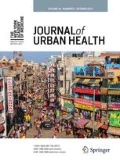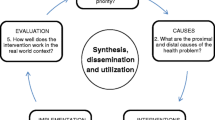Abstract
Globally, health and social inequities are growing and are created, actively maintained, and aggravated by existing policies and practices. The call for evidence-based policy making to address this injustice seems a promising strategy to facilitate a reversal of existing strategies and the design of new effective programming. Acting on evidence to address inequities requires congruence between identifying the major drivers of disparities and the study of their causes and solutions. Yet, current research on inequities tends to focus on documenting disparities among individuals or subpopulations with little focus on identifying the macro-social causes of adverse population health. Moreover, the research base falls far short of a focus on the solutions to the complex multilevel drivers of disparities. This paper focuses upon recommendations to refocus and improve the public health research evidence generated to inform and create strong evidence-based recommendations for improving population health.

Similar content being viewed by others
References
Commission on Social Determinants of Health. Closing the Gap in a Generation: Health Equity Through Action on the Social Determinants of Health. Geneva: World Health Organization; 2008.
Wilkinson R, Pickett K. Spirit Level: Why More Equal Societies Almost Always Do Better. London: Allen Lane; 2009.
Szanton P. Not Well Advised: The City as Client—an Illuminating Analysis of Urban Governments and Their Consultants. San Jose: Authors Choice; 2001.
Brownson R, Royer C, Ewing R, McBride T. Researchers and policymakers: travelers in parallel universes. Am J Prev Med. 2006;30(2):164–172.
Choi B, Gupta A, Ward B. Good thinking: six ways to bridge the gap between scientists and policy makers. J Epidemiol Community Health. 2009;63:179–180.
Exworthy M. Policy to tackle the social determinants of health: using conceptual models to understand the policy process. Health Policy Plan. 2008;23:318–327.
Jansen M, van Oers H, Kok G, de Vries N. Public health: disconnections between policy, practice and research. Health Res Policy Syst. 2010;8(37).
Murphy K, Fafard P. Knowledge translation and social epidemiology: taking power, politics, and values seriously. In: O’Campo P, Dunn J, eds. Rethinking Social Epidemiology: Toward a Science of Change. New York: Springer; 2011.
Ogilvie D, Craig P, Griffin S, Macintyre S, Wareham N. A translational framework for public health research. BMC Public Health. 2009;9(116).
Petticrew M. When are complex interventions ‘complex’? When are simple interventions ‘simple’? Eur J Public Health. 2011;21(4):397–398.
Petticrew M, Whitehead M, Macintyre S, Graham H, Egan M. Evidence for public health policy on inequalities: 1: the reality according to policymakers. J Epidemiol Community Health. 2004;58:811–816.
Best A, Hiatt R, Norman C. Knowledge integration: conceptualizing communications in cancer control systems. Patient Educ Couns. 2008;71(3):313–327.
Graham I, Logan J, Harrison M, et al. Lost in knowledge translation: time for a map? J Contin Educ Heal Prof. 2006;26:13–24.
Mitton C, Adair C, McKenzie E, Patten S, Perry B, Adair E. Knowledge transfer and exchange: review and synthesis of the literature. Milbank Q. 2007;85(4):729–768.
Canadian Center for Policy Alternatives. Alternative Federal Budget 2011: Rethink, Rebuild, Renew: A Post-Recession Recovery Plan. Ottawa: Canadian Center for Policy Alternatives; 2011.
Mishel L, Shierholz H. Sustained, High Joblessness Causes Lasting Damage to Wages, Benefits, Income and Wealth. Washington, DC: Economic Policy Institute; 2011.
O’Campo P, Dunn J, eds. Rethinking Social Epidemiology: Toward a Science of Change. New York: Springer; 2011.
Cox J. US Housing Crisis Is Now Worse Than the Great Depression. www.cnbc.com; 2011.
Hough A. More middle class families ‘will become homeless’ due to recession. The Telegraph, 2011.
Rampell C. Length of unemployment continues to break records. The New York Times. August 5, 2011.
Shah A. Today, over 22,000 children died around the world. Global Issues: Social, Political, Economic and Environmental Issues That Affect Us All. Available at: http://www.globalissues.org/article/715/today-over-22000-children-died-around-the-world.
Fieldhouse A, Shapiro I. The Facts Support Raising Revenues from the Highest-Income Households. Washington, DC: Economic Policy Institute & The Century Foundation; 2011.
Krugman P. The Hijacked Crisis. New York Times. August 11, 2011.
Stiglitz J. Of the 1%, by the 1%, for the 1%. Vanity Fair; May 2011.
Yalnizyan A. The Rise of Canada’s Richest 1%. Ottawa: Centre for Policy Alternatives; 2010.
Berkman LF. Seeing the forest and the trees: new visions in social epidemiology. Am J Epidemiol. 2004;160:1–2.
House JS. Understanding social factors and inequalities in health: 20th century progress and 21st century prospects. J Heal Soc Behav. 2002;43(2):125–142.
Putnam S, Galea S. Epidemiology and the macrosocial determinants of health. J Public Health Policy. 2008;29(3):275–289.
Schwartz SD, Carpenter KM. The right answer for the wrong question: consequences of type iii error for public health research. Am J Public Health. 1999;89(8).
Bonneux L. From evidence based bioethics to evidence based social policies. Eur J Epidemiol. 2007;22:483–485.
Braveman P, Barclay C. Health disparities beginning in childhood: a life-course perspective. Pediatrics. 2009;124(Suppl 3):S163–S175.
Muntaner C, Sridharan S, Chung H, et al. The solution space: developing research and policy agendas to eliminate employment-related health inequalities. Int J Heal Serv. 2010;40(2):309–314.
Armstrong R, Doyle J, Lamb C, Waters E. Multi-sectoral health promotion and public health: the role of evidence. J Public Health. 2006;28(2):168–172.
Ministerial Summit on Health Research. The Mexico statement on health research: knowledge for better health: strengthening health systems Available at: http://www.who.int/rpc/summit/agenda/Mexico_Statement-English.pdf
Whitehead M, Petticrew M, Graham H, Macintyre SJ, Bambra C, Egan M. Evidence for public health policy on inequalities: 2: assembling the evidence jigsaw. J Epidemiol Community Health. 2004;58(10):817–821.
Rosenfield P. The potential for transdisciplinary research for sustaining and extending linkages between the health and social sciences. Soc Sci Med. 1992;35(11):1343–1357.
Kirst M, Schafer-McDaniel N, Hwang S, O’Campo P. Converging Disciplines: A Transdisciplinary Research Approach to Urban Health Problems. Berlin: Springer; 2010.
Kirst M, O’Campo P. Realist review methods for complex health problems. In: O’Campo P, Dunn J, eds. Rethinking Social Epidemiology: Toward a Science of Change. New York: Springer; 2011.
Murphy K, Wolfus B, Lofters A. From complex problems to complex problem-solving: transdisciplinary practice as knowledge translation. In: Kirst M, Schafer-McDaniel N, Hwang S, O’Campo P, eds. Converging Disciplines: A Transdisciplinary Research Approach to Urban Health Problems. Berlin: Springer; 2010.
Noonan E, Bjorndal A. The Campbell Collaboration. Available at: http://www.thecochranelibrary.com/details/editorial/839335/The-Campbell-Collaboration.html. Accessed August 15, 2011.
Aronson R, Wallis AB, O’Campo P, Whitehead T, Schafer P. Ethnographically informed community evaluation: a framework and approach for evaluating community based initiatives. Matern Child Healt J. 2007;11(2):97–109.
McKey R, Condelli L, Ganson H, Barrett B, McConkey C, Plantz M. The Impact of Head Start on Children, Families and Communities. Final Report of the Head Start Evaluation, Synthesis and Utilization Project. Washington, DC: Superintendent of Documents, U.S. Government Printing Office; 1985.
Saari E, Kallio K. Developmental impact evaluation for facilitating learning in innovation networks. Am J Eval. 2011;32:227–245.
Chen H-T. Theory-Driven Evaluations. Newbury Park: Sage; 1990.
Coryn C, Noakes L, Westine C, Schroter D. A systematic review of theory-drive evaluation practice from 1990–2009. Am J Eval. 2011;32(3):199–226.
Greenhalgh T, Wong G, Westhorp G, Pawson R. Protocol—realist and meta-narrative evidence synthesis: evolving standards (RAMESES). BMC Med Res Methodology. 2011;11(1):115.
Ranmuthugala G, Cunningham FC, Plumb JJ, et al. A realist evaluation of the role of communities of practice in changing healthcare practice. Implementation Sci. 2011;6(49).
Wong G, Greenhalgh T, Pawson R. Internet-based medical education: a realist review of what works, for whom and in what circumstances. BMC Med Education. 2010;10(12).
O’Campo P, Kirst M, Schaefer-McDaniel N, Firestone M, Scott A, McShane K. Community-based services for homeless adults experiencing concurrent mental health and substance use disorders: a realist approach to synthesizing evidence. J Urban Health. 2009;86(6):965–989.
O’Campo P, Kirst M, Tsamis C, Chambers C, Ahmad F. Implementing successful intimate partner violence screening programs in health care settings: evidence generated from a realist-informed systematic review. Soc Sci Med. 2011;72(6):855–866.
Preventive Services US. Task force. Recommendation statement: screening for family and intimate partner violence. Ann Intern Med. 2004;140(5):382–386.
Durlak JA, DuPre EP. Implementation matters: a review of research on the influence of implementation on program outcomes and the factors affecting implementation. Am J Community Psychol. 2008;41:327–350.
Wandersman A, Duffy J, Flaspohler P, et al. Bridging the gap between prevention research and practice: the interactive systems framework for dissemination and implementation. Am J Community Psychol. 2008;41:171–181.
Gamble JAA. A Developmental Evaluation Primer. Montréal: JW McConnell Family Foundation; 2008.
Patton MQ. Developmental evaluation. Eval Pract. 1994;15(3):311–319.
Keller C, Goering P, Hume C, et al. Initial implementation of Housing First in five Canadian cities: how do you make the shoe fit, when one size does not fit all? Psychiatric Rehabilitation Journal. 2012; in press.
Macnaughton EGP, Nelson G. Using mixed methods within the At Home/Chez Soi Housing First project: a strategy to evaluate the implementation of a complex population health intervention for people with lived experience of homelessness and mental illness. Canadian Journal of Public Health. 2012; in press.
Devaney B, Howell E, McCormick M, Moreno L. Reducing Infant Mortality: Lessons Learned from Healthy Start. Princeton: Mathematica Policy Research; 2000.
Sherk J. How Congress Can Support, Not Hinder, Labor Market Recovery. Washington, DC: Heritage Foundation; 2011.
Health Canada. Tobacco Control Programme, Health Canada Supplementary Tables, Youth Smoking Survey 2006–07. Table 4a. Smoking status by province, grades 5–9, Canada, 2006-07. 2008-12-22. Available at: http://www.hc-sc.gc.ca/hc-ps/tobac-tabac/research-recherche/stat/_survey-sondage_2006-2007/table-04-eng.php.
Brinn MP, Carson KV, Esterman AJ, Chang AB, Smith BJ. Mass media interventions for preventing smoking in young people. Cochrane Database of Systematic Reviews. 2010;(11):CD001006.
Carson KV, Brinn MP, Labiszewski NA, Esterman AJ, Chang AB, Smith BJ. Community interventions for preventing smoking in young people. Cochrane Database of Systematic Reviews. 2011;(7):CD001291.
Lantz PM. Youth Smoking Prevention Policy: Lessons Learned and Continuing Challenges. Washington, DC: The National Academies; 2004.
Lovato C, Linn G, Stead LF, Best A. Impact of tobacco advertising and promotion on increasing adolescent smoking behaviours. Cochrane Database of Systematic Reviews. 2003;(4):CD003439.
Priest N, Armstrong R, Doyle J, Waters E. Policy interventions implemented through sporting organisations for promoting healthy behaviour change. Cochrane Database Syst Rev. 2008;3:CD004809.
Stead LF, Lancaster T. Interventions for preventing tobacco sales to minors. Cochrane Database of Systematic Reviews. 2005;(1):CD001497.
Thomas RE, Baker PRA, Lorenzetti D. Family-based programmes for preventing smoking by children and adolescents. Cochrane Database of Systematic Reviews. 2007;(1):CD004493.
McCall L, Kenworthy L. Americans’ social policy preference in the era of rising inequality. Perspectives on Politics. 2009;7(3):459–484.
Russell E, Dufour M. Rising Profit Shares, Falling Wage Shares. Toronto: Centre for Policy Alternatives; 2007.
Leischow S, Best A, Trochim W, et al. Systems thinking to improve the public’s health. Am J Prev Med. 2008;35(2S):S196–S203.
Schulz A, Northridge M. Social determinants of health: implications for environmental health promotion. Health Educ Behav. 2004;31(3):455–471.
Chapman J, Thompson J. The Economic Impact of Local Living Wages. Washington, DC: Economic Policy Institute; 2006.
Zabin C, Martin I. Living Wage Campaigns in the Economic Policy Arena: Four Case Studies from California. Berkeley: Center for Labor Research and Education, Institute of Industrial Relations, University of California; 1999.
Luce S. The role of community involvement in living wage ordinances. Ind Relat. 2005;44(1):32–58.
Pollin R. Evaluating living wage laws in the United States: good intentions and economic reality in conflict? Econ Dev Q. 2005;19(1):3–24.
Oxman A, Lavis J, Lewin S, Fretheim A. SUPPORT tools for evidence-informed health Policymaking (STP) 10: taking equity into consideration when assessing the findings of a systematic review. Health Res Policy Syst. 2009;7(Suppl 1):S10.
Acknowledgments
This work has been funded in part by the Canadian Institutes of Health Research under grant #101693, entitled “Power, Politics, and the Use of Health Equity Research.”
Author information
Authors and Affiliations
Corresponding author
Rights and permissions
About this article
Cite this article
O’Campo, P. Are We Producing the Right Kind of Actionable Evidence for the Social Determinants of Health?. J Urban Health 89, 881–893 (2012). https://doi.org/10.1007/s11524-012-9695-5
Published:
Issue Date:
DOI: https://doi.org/10.1007/s11524-012-9695-5




